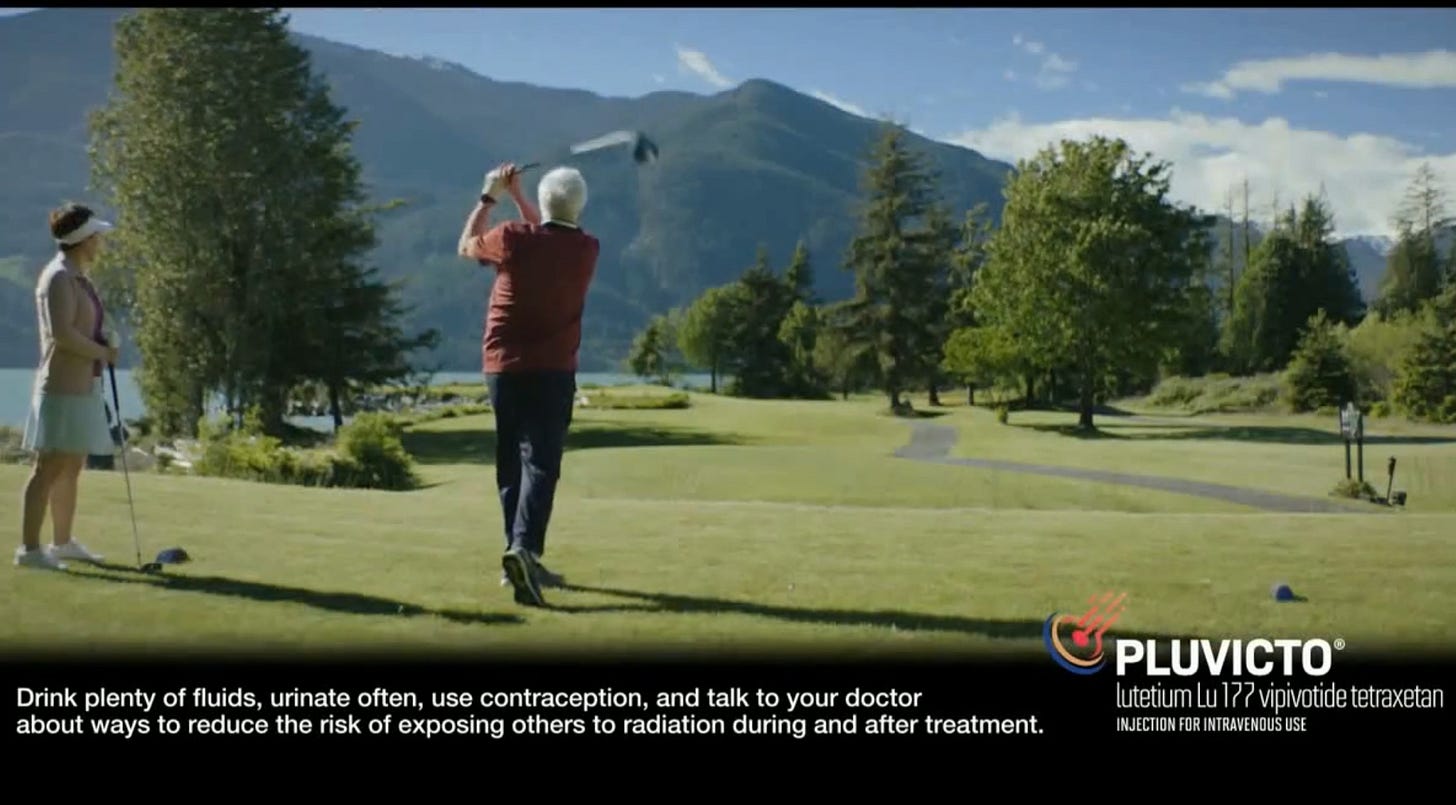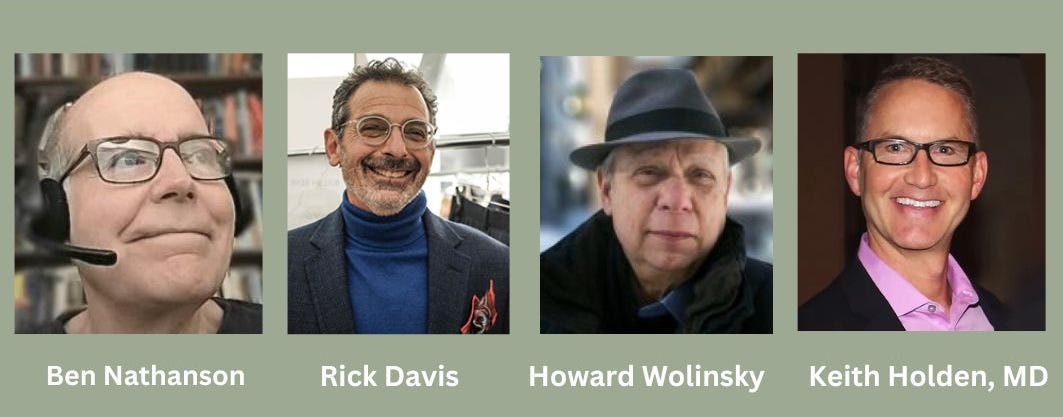"Upbeat" drug ad upsets some with prostate cancer
"Deceptive...extraordinarily upbeat/whimsical...uncomfortable...annoying"
I was watching a college football bowl game when a drug ad popped up on my TV screen. “Time to mute the TV,” I thought. But before I could mute it, I heard that the drug was for metastatic prostate cancer. The happy, fun-loving men in the commercial confused me. This is the picture of metastatic prostate cancer?
The images in the commercial didn’t fit the image of metastatic prostate cancer that I had in my head.
I wasn’t the only one bothered by this ad.
“Thanks for identifying this ad. It's deceptive and should be called out.”1
That was the email response I got from Ben Nathanson, who was diagnosed with prostate cancer in 2018, had a prostatectomy in 2019, radiation in 2021, and a year of hormone therapy. His update:
I now have metastatic prostate cancer (the salvage radiation failed) and am on hormone therapy. My PSA has started to rise making me potentially a candidate for Pluvicto. … I’d have to fail chemotherapy first.
He is a moderator in the AnCan video support group for advanced prostate cancer and writer of the blog Progressions: A deep look at prostate cancer. He wrote more:
This ad leads me to think that Pluvicto may cure me -- that it's another shot at durable remission.
In a narrow sense, Pluvicto does offer another chance. You can't even get it till other treatments have failed. But every scenario in the ad ends in triumph, and patients are clearly meant to think, "Here, finally, is my turnaround!" Nobody who's curable qualifies for Pluvicto.
I have some concern as well about driving up demand for this drug. Pluvicto needs to be administered by specialists, and there are already too few nuclear medicine docs in the U.S. Demand might tempt under-qualified practitioners to administer it.
Rick Davis was one of the founders of AnCan, previously known as the Answer Cancer Foundation. He had a very different view of the commercial. He was diagnosed in 2007 with locally advanced prostate cancer and chose two forms of radiation and 28 months of hormone therapy.
For me it strikes the right tone and market. Knowing the drug, it's a decent ad.
Living with any chronic disease requires perseverance, so stressing that is appropriate. The name of the game for managing advanced prostate cancer is to use a treatment for as long as you can before it fails you... and you have to find an alternative.
It doesn't mention that the treatment may not last more than a few months to a couple of years.
In full disclosure, Novartis supports AnCan. We do not provide any individual product branding.
Howard Wolinsky has been a health care/medical journalist for as long as I have (a bit longer perhaps) - more than 50 years. He was diagnosed with low-risk prostate cancer in 2010. He has become a patient advocate for men with prostate cancer. He’s a co-founder of an AnCan low-risk prostate cancer support group and is one of the founders of Active Surveillance Patients International. That group describes active surveillance:
Active Surveillance is the process of a patient and their doctor working together to actively monitor prostate cancer without intrusive treatments. Some physicians will have a predetermined program to manage low-risk cancer that hasn’t spread outside of the prostate. For men with low-risk and some intermediate risk cancers…the cancer usually grows slowly and will not require aggressive treatments. If the PSA (blood test) rises suddenly, then additional action could be required.
So, to be clear, Wolinsky does not have metastatic prostate cancer. He’s been able to employ active surveillance for 14 years. His observations - as a professional communicator, man with prostate cancer, and advocate - are noteworthy:
The thing that struck me about the Pluvicto ad was it seemed extraordinarily upbeat/whimsical and was trying to make the treatment of metastatic cancer almost fun while listing the horrible side effects. I guess life goes on and Pluvicto makes it easier to enjoy? Watching football games, playing Scrabble, playing golf, baking bread in a Norman Rockwellesque scene, playing fetch with your retriever.
Also, it's all about V--as in victory.
People often use military language and sports language to try to encourage patients to be "victors" in the war, winning The Big Game and fighting cancer. This ad relies on comparisons to these comparisons.
Some cancer patients feel encouraged by this sort of talk. Some with advanced cancers feel pressure and depression because they can't "defeat" their cancers.
Keith Holden, MD, is a physician with advanced prostate cancer. He was diagnosed in 2017 at age 53. He’s not a fan of TV drug ads, and especially not this one.
Honestly, every time it comes on while I'm watching television, it makes me uncomfortable.
It's annoying because it's like most direct-to-consumer television commercials for pharmaceuticals: upbeat music, happy, healthy-looking people cavorting in nature or doing something fun, and offering something that usually isn't that great and meant for a select few. Very few of the men with prostate cancer who see this commercial will be candidates, so for many, it may offer an illusion of false hope.
For the men who are candidates, the clinical trial that resulted in its approval showed only a 4-month increase in overall survival. While that is statistically meaningful, I don't consider that clinically meaningful.
Dr. Holden also addressed a question that always hits me as I see drug ads during televised sporting events for a condition that has a limited market. Why would a drug company buy advertising time that will reach millions of men and women who are not the target for a drug ad for metastatic prostate cancer?
I think pharmaceutical companies have so much money they can throw some away because I don't see how they can get a return on this ad unless they are trying to educate doctors who could potentially prescribe it. Sadly, that may be the case.
I’m not a physician and I don’t have prostate cancer. But I spent a large part of my career analyzing media messages - commercials, PR, news stories, blog posts, etc. - about drugs. In this article, I am not questioning the potential benefits of Pluvicto. I am only questioning the advertising. Some might say, “Don’t all drug ads use these kinds of cheery images?” That may be. But this is about metastatic prostate cancer - not about toenail fungus or early hair loss or erectile dysfunction.
As someone not affected by the condition for which the drug is intended, I am in the overwhelming majority of similarly unaffected people who see that commercial. Hundreds of thousands saw that ad during the same football bowl game I was watching. Millions have probably seen it since it was released.
In recent years, drug companies have spent more than seven billion dollars a year on direct-to-consumer drug advertising - money that could be spent on more research and development.
The U.S. and New Zealand are the only countries that still allow direct-to-consumer drug advertising. but there’s a move underway to ban them in New Zealand. So Americans may soon have another, albeit dubious, reason for shouting, “We’re #1!”
Howard Wolinsky invites any of you to join him tomorrow - Saturday, January 4, at noon Eastern time - for his Substack blog’s (TheActiveSurveillor.com) webinar, "Active Surveillance ‘25: The Year in Review" featuring experts on the disease. Subjects to be covered include diet, AI, and genetics - and their impact on prostate cancer. Register here: https://us02web.zoom.us/meeting/register/tZYkf-iupjwjEtTHf_y7OOJigw5VhMZXRfQM
After the article was published, Ben Nathanson wrote this to me: “I wish I called the ad ‘misleading’ rather than ‘deceptive,” which suggests malicious intent.









Thank you for highlighting this. As a former marketer and now a visual storyteller working with my wife, who was diagnosed with cancer seven years ago, this resonates deeply. We've often encountered inauthentic representations of illness—either overly tragic or unrealistically triumphant—leaving little space for the complex emotional middle ground that many people experience.
While there’s some research on how words impact the patient and caregiver community, I’ve seen little about how visual depictions affect mental health. If you know of any, I’d love to hear about it. From our work over the past seven years, it’s clear many people feel unseen, their experiences misrepresented or sugar-coated, often for profit, which only deepens feelings of isolation.
In our own work, including our recently released photobook HER2: The Diagnosed, The Caregiver, and Their Son, we’ve aimed to share more nuanced stories.
I often wonder if these ads should be labeled direct to investors as opposed to direct to consumers.